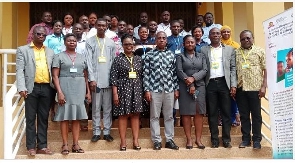 Profe Fredrick Kwaku Sarfo Kantanka (foruth right) in a group photo with workshop participants
Profe Fredrick Kwaku Sarfo Kantanka (foruth right) in a group photo with workshop participants
Ghana needs a gender equality strategy to help change social norms and perceptions on women's economic participation in traditionally male-dominated environments.
Professor Fredrick Kwaku Sarfo Kantanka, Vice Chancellor of the Akenten Appiah-Menka University of Skills Training and Entrepreneurial Development (AMMUSTED), said it was important for the country to develop strategies to bring women at par with their male counterparts in all fields of endeavour.
Prof. Sarfo Kantanka, said this in an address read on his behalf at a gender-responsive pedagogy training of trainers workshop organized by AMMUSTED for 25 trainers from some selected technical institutions in Accra, Kumasi and Takoradi, in Kumasi.
A gender-responsive pedagogy tries to integrate gender into the fabric of teaching and learning, which includes the process of curriculum design and approaches to its assessment.
The three-day workshop, which was supported by the World University Service of Canada (WUSC), aimed at equipping the participants with the requisite skills, knowledge and attitude to empower them to respond adequately to the learning needs of females and males through the use of gender approaches.
It was also to enable the participants to acquire and develop an integrated set of knowledge and skills on gender TVET and other subject areas.
It is a five-year collaborative project initiated by Innovative in Non-Traditional Vocational Education and Skills Training (INVEST) and funded by Global Affairs Canada (GAC).
Prof. Sarfo Kantanka said AMMUSTED’s mandate was to provide higher education in technical, vocational and entrepreneurial training for job creation and economic development.
He said it was time to bring together a diverse network of students, volunteers, schools, governments and businesses to share the vision of TVET for accelerated development of the country.
Gladys Quansah, an advisor and coordinator of the project, encouraged the trainers to work hard to ensure that the models of the workshop reduced gender-specific barriers to women’s economic participation.
They should also work hard to promote and enhance access to decent work for marginalized women to high growth in non-traditional trades.